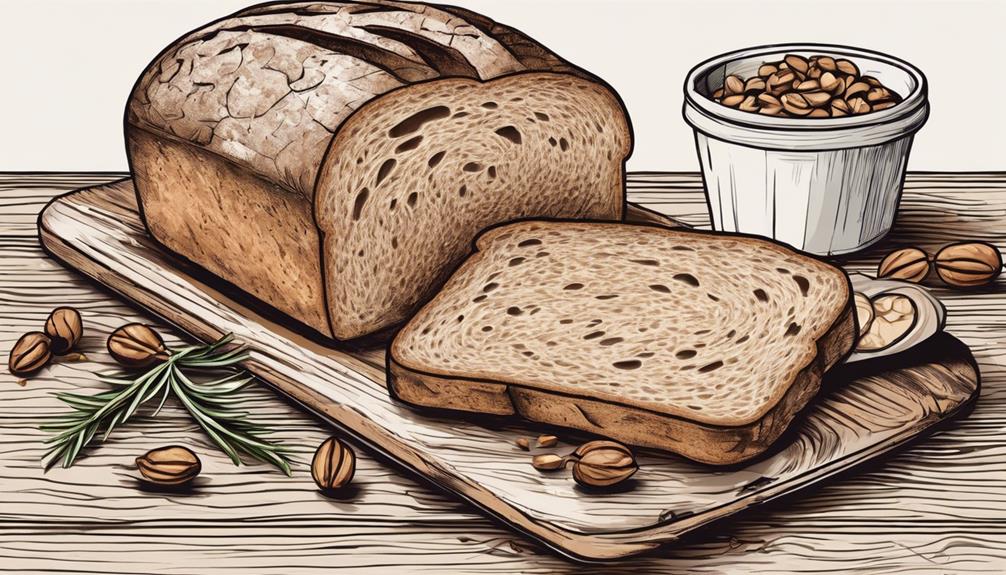Will Epsom Salts Help With Gout
Yes, Epsom salts can help with gout. They contain magnesium sulfate, which reduces inflammation and alleviates pain by being absorbed through your skin. Soaking the affected area in an Epsom salt bath can greatly relieve the painful swelling caused by uric acid crystal buildup in your joints.
For best results, dissolve 1-2 cups of Epsom salts in warm water at approximately 100°F, and soak for 20-30 minutes, 2-3 times a week.
However, always consult a healthcare professional to make sure it’s compatible with your current gout treatment plan. To explore more about using Epsom salts for gout relief, continue on.
Key Takeaways
- Epsom salts have anti-inflammatory properties that can reduce gout-related swelling.
- The magnesium sulfate in Epsom salts helps alleviate pain associated with gout.
- Epsom salt baths promote muscle relaxation, aiding in gout pain relief.
- Skin absorption of Epsom salts delivers targeted relief to gout-afflicted joints.
- Consult a healthcare professional to ensure Epsom salts are suitable for your gout treatment plan.
Understanding Gout
Understanding gout requires a thorough knowledge of its causes, symptoms, and the physiological processes involved in its development. Gout is primarily caused by the buildup of uric acid crystals in the joints, stemming from elevated uric acid levels in the blood. These crystals can provoke intense pain and inflammation, particularly affecting the big toe. Recognizing common gout triggers is essential; they include consuming purine-rich foods, excessive alcohol intake, and certain health conditions like obesity and hypertension.
For effective gout prevention, you should focus on lifestyle modifications and dietary changes. Gout diet restrictions play a significant role; limiting intake of red meat, shellfish, and sugary beverages can help control uric acid levels. Drinking plenty of water and consuming low-fat dairy products can also be beneficial.
When it comes to gout treatment options, they typically involve medications to reduce pain and inflammation, as well as drugs to lower uric acid levels. Non-pharmacological measures include maintaining a healthy weight and choosing a balanced diet.
What Are Epsom Salts?
Epsom salts, frequently utilized for their medicinal properties, consist of magnesium sulfate and are renowned for their ability to alleviate pain and reduce inflammation. Composed of magnesium and sulfate ions, Epsom salts offer several health benefits, particularly when used in baths or foot soaks.
One of the primary Epsom salt benefits is pain relief. Magnesium sulfate can be absorbed through the skin, making it effective for localized pain management. When you soak in a warm bath with Epsom salts, the magnesium penetrates your skin, promoting relaxation and easing muscle tension. This skin absorption process aids in the elimination of toxins and supports overall pain relief.
Clinical studies have shown that magnesium sulfate’s anti-inflammatory properties can help reduce swelling and discomfort. By soaking in an Epsom salt bath, you can experience a significant reduction in pain and inflammation. This is particularly beneficial for conditions like gout, where targeted relief is essential.
Additionally, magnesium in Epsom salts helps promote relaxation, which can further alleviate pain and stress. Integrating Epsom salt soaks into your routine may enhance your overall well-being, offering both physical and mental relaxation. Always consult with a healthcare professional to make sure it’s appropriate for your specific needs.
Benefits of Epsom Salts for Gout
When considering the benefits of Epsom salts for gout, you’ll find that their essential anti-inflammatory properties are particularly effective in reducing the painful swelling associated with this condition. Epsom salts, comprised mainly of magnesium sulfate, offer significant gout relief by targeting inflammation at the source. The magnesium in Epsom salts enhances pain management by relaxing muscles and improving blood flow, which can help alleviate the intense discomfort caused by gout flare-ups.
Skin absorption plays an important role in the efficacy of Epsom salt treatments. When you soak in an Epsom salt bath, magnesium and sulfate are absorbed through your skin, delivering targeted relief directly to the afflicted area. This method allows for quick and efficient uptake of magnesium, which is known to flush out toxins and regulate nerve function, contributing further to gout relief.
Additionally, the regular use of Epsom salt baths can contribute to long-term joint health. By reducing joint inflammation and promoting overall pain management, Epsom salts serve as a practical home remedy for managing gout symptoms.
It’s important to consult a healthcare professional to make sure this treatment aligns with your specific condition and overall treatment plan.
How to Use Epsom Salts
To use Epsom salts for gout relief, start by dissolving 1-2 cups of Epsom salts in a basin of warm water. Guarantee the water temperature is comfortable but not too hot, ideally around 100°F (37.8°C). This soaking technique helps maximize the absorption of magnesium and sulfates through your skin.
| Aspect | Recommendation | Tips & Notes |
|---|---|---|
| Epsom salt concentration | 1-2 cups per basin of warm water | Adjust based on personal comfort |
| Water temperature | Around 100°F (37.8°C) | Use a thermometer for accuracy |
| Recommended duration | 20-30 minutes | Avoid exceeding 30 minutes |
| Frequency of foot baths | 2-3 times per week | Consistency is key for best results |
For additional benefits, consider adding essential oils like lavender or eucalyptus to enhance relaxation and reduce inflammation. After soaking, dry your feet thoroughly to prevent any residual moisture from causing skin issues. Follow up with a moisturizing routine using a gentle, hydrating lotion to maintain skin health and prevent dryness.
This method not only helps in reducing inflammation and pain associated with gout but also supports overall foot health. Regular Epsom salt foot baths can be a soothing home remedy for managing gout symptoms effectively.
Consult a Healthcare Professional
Before incorporating Epsom salts into your gout management routine, consult a healthcare professional to confirm that it complements your existing treatment plan. Obtaining medical advice is essential for ensuring that Epsom salts are suitable for your specific condition.
Professional guidance can provide you with personalized recommendations based on your medical history and current health status.
An expert consultation will help determine the appropriate dosage and usage instructions tailored to your individual needs. This individualized treatment approach ensures that using Epsom salts won’t interfere with any prescribed medications or therapies you’re currently following.
Additionally, healthcare professionals can monitor your progress, making necessary adjustments to optimize your gout management.
Frequently Asked Questions
Conclusion
To guarantee, soaking in Epsom salts might provide some relief from gout pain and inflammation due to its magnesium content, which helps relax muscles and reduce swelling.
However, it’s crucial to consult your healthcare professional before incorporating this remedy into your routine to make sure it complements your specific treatment plan.
With their guidance, you can determine if Epsom salts are a suitable addition to your gout management strategy, potentially offering a natural, soothing option for your discomfort.
Disclaimer: This article is intended for educational and informational purposes only. It should not be considered as professional medical advice, diagnosis, or treatment. Always consult with a qualified healthcare provider, such as a rheumatologist or physician, before making any changes to your diet or treatment plan for managing gout or any other medical condition. The information presented in this article is general and may not be suitable for all individuals. Seek personalized guidance from a medical professional to ensure appropriate care based on your specific circumstances and health status.







